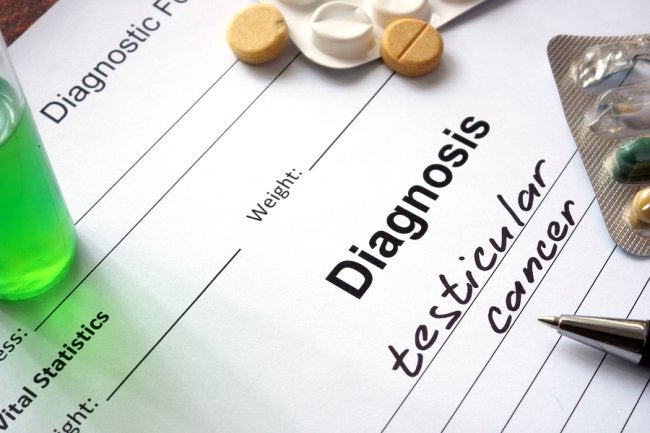Get the Facts About Testicular Cancer

Testicular cancer stands out from other forms of cancer in that it is more common in young men than older men. Because it often occurs in a population that is not considered to have a high cancer risk, men with testicular cancer may often miss the early symptoms because they are unsure of what to look for. Fortunately, cancer treatment from your urologist can be effective in helping you beat this disease. Explore the facts about this disease and the testicular cancer treatments so you can be vigilant about your own health.
Recognizing Your Risk Factors
There are several risk factors for testicular cancer, however, most men who develop this kind of cancer do not have any noticeable risk factors present. Having an undescended testicle is one of the biggest risk factors, so your doctor may monitor you for testicular cancer symptoms if you have this condition. HIV infections, being Caucasian, and having a family or personal history of testicular cancer may also increase your risk. Approximately 50 percent of men with testicular cancer are between 20 and 34, but it can and does affect men in all age groups, including infants.
Spotting the Symptoms
A lump or swelling in one testicle is a common sign of cancer. In some cases, men may develop gynecomastia as the result of testicular cancer. Young boys who develop testicular cancer may experience an early onset of puberty. In some cases, men do not have symptoms at all in the early stages and may develop back pain, belly pain, headaches, and shortness of breath as a result of testicular cancer that has spread. Performing self-exams can help men recognize the symptoms sooner.
Talking About Treatment
Testicular cancer treatments vary depending on the stage of the cancer at the time of diagnosis. Surgery to remove the affected testicle as well as chemotherapy, radiation, and stem cell therapy can all be helpful.
Testicular cancer treatment in Nashville starts with the urologists at Urology Associates. If you have symptoms, get on the road to diagnosis and treatment today by calling (855) 901-1338.
Recent Posts
categories
- Uncategorized
- Bladder Cancer
- Women's Sexual Health
- MonaLisa Touch
- Urology
- Urologist
- Erectile Dysfunction
- Kidney Cancer
- Incontinence
- Prostate
- MonaLisa Touch Laser Treatment
- Kidney Stones
- Urinary Tract Infections
- Event
- Sexual Dysfunction
- Testicular Cancer
- Prostate Cancer
- Urology Surgery Center
- urinary incontinence
- vaginismus
- noncoital pain disorder
- Hypoactive Sexual Desire Disorder
- Infographic
- provenge
- Xofigo
- robotic surgery
- hormone replacement
- diabetes
- renal cell carcinoma
- pelvic pain
- hematuria
- sexual health
- chronic testicular pain
- premature ejaculation
- Men's Health Clinic
- Dr. Melvin Seard
- Interstitial Cystitis
- vasectomy
- overactive bladder
- vaginal atrophy
- nocturia
- bladder infections
- urethral strictures
- Acute Epididymitis
- low sex drive
- circumcision
- pelvic floor dysfunction
- Peyronie's Disease
- prostatitis
- female sexual dysfunction
- varicocele
- difficult urination
- low libido
- PSA levels
- male fertility
- penile prosthesis
- prostatic intraepithelial neoplasia
- male infertility
- estrogen levels
- nurse navigator
- stress urinary incontinence
- vaginal yeast infection
- elevated psa
- painful sex
- adult circumcision
- epididymitis
- OAB
- kidney infection
- penile cancer
- pelvic organ prolapse
- Vasectomy Reversal
- bone health
- cystectomies
- clinical trials
- bloody urine
- Advanced Therapeutic Center
- WISH MedSpa
- neurogenic bladder
- WISH Team
- prostate biopsies
- BPH
- fecal incontinence
- lithotripsy
- osteoporosis
- kidney cysts
